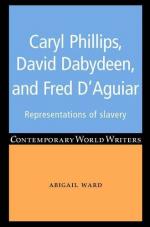|
This section contains 1,191 words (approx. 4 pages at 300 words per page) |

|
SOURCE: "Slaves to Fate," in New York Times Book Review, January 30, 1994, p. 10.
In the following review, Burroway considers Crossing the River "a brilliant coherent vision" and "a book with an agenda."
"The past is never dead," William Faulkner observed. "It's not even past." This perception is brought home in Caryl Phillips's fifth novel, Crossing the River—which, although it plays with disjunctive time, presents a brilliantly coherent vision of two and a half centuries of the African diaspora.
The main body of Mr. Phillips's novel consists of four taut narratives—two white voices, two black; two male, two female. But its structure is poetic, built on a single refrain: "Why have you forsaken me?" The voices are richly counterpointed, and the forsakings are as various as the author's extraordinary imagination can make them.
In the prologue, a nameless' African father, his crops having failed, sells his children to...
|
This section contains 1,191 words (approx. 4 pages at 300 words per page) |

|


